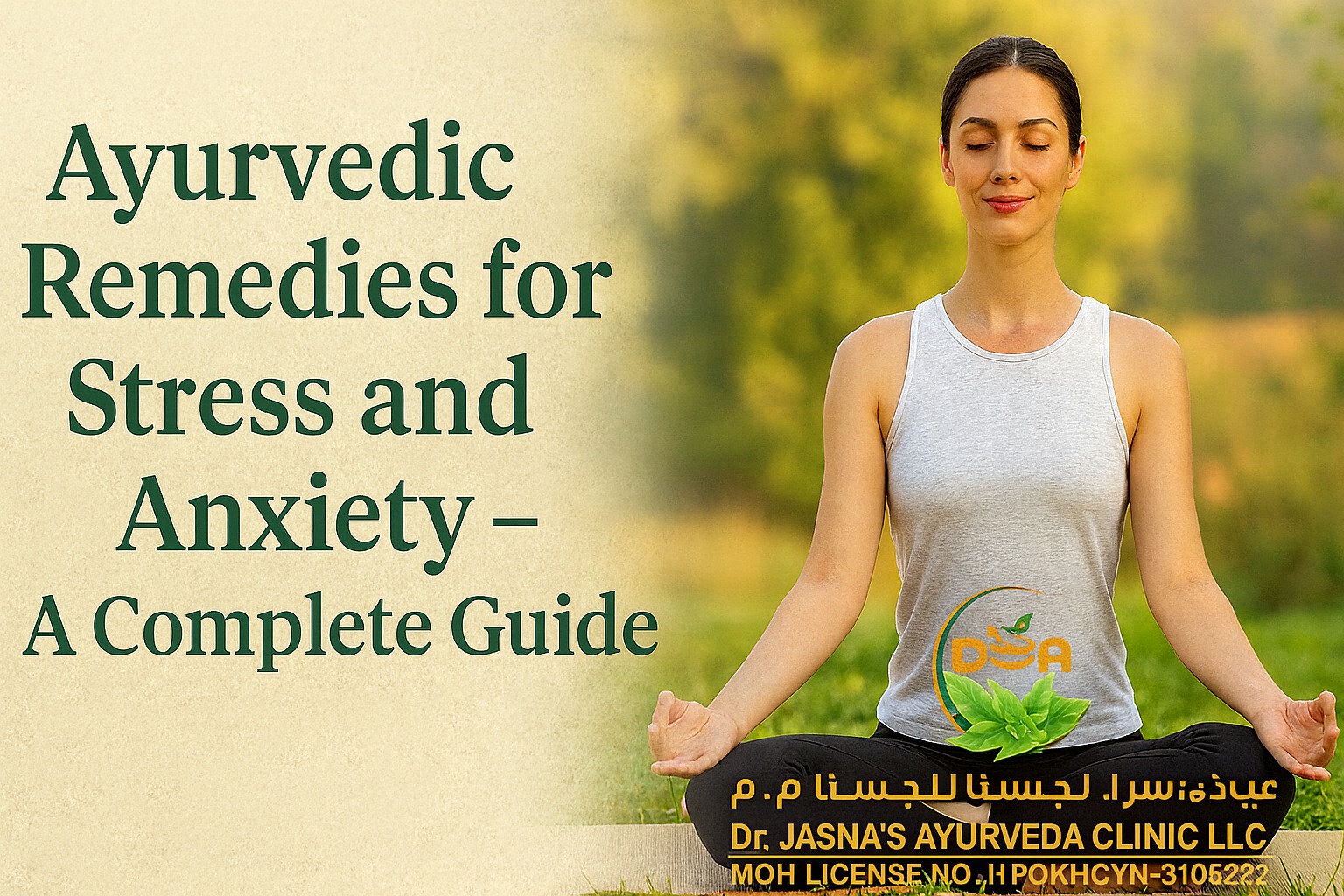
In today’s fast-paced world, stress and anxiety have become almost unavoidable companions in our daily lives. Whether it is due to work pressures, family responsibilities, financial worries, or social expectations, the modern lifestyle often leaves individuals physically drained and emotionally exhausted. While stress to some extent is natural, chronic stress and anxiety can lead to serious health problems like high blood pressure, sleep disorders, weakened immunity, and even heart disease.
Ayurveda, the 5,000-year-old holistic system of medicine, provides profound insights into managing stress and anxiety naturally. Unlike temporary quick fixes, Ayurveda addresses the root cause of mental imbalances and helps in restoring harmony between the body, mind, and spirit. In this blog, we will explore the causes of stress according to Ayurveda, the role of doshas, and practical Ayurvedic remedies that can help reduce stress and anxiety effectively.
According to Ayurveda, the human body is governed by three bio-energies or doshas: Vata, Pitta, and Kapha. Each dosha plays a unique role in maintaining balance and health. When these doshas are out of balance due to lifestyle habits, diet, or external factors, it results in physical and mental discomfort.
Vata imbalance often leads to restlessness, nervousness, overthinking, and sleep disorders.
Pitta imbalance manifests as irritability, anger, frustration, and burnout.
Kapha imbalance results in lethargy, depression, and lack of motivation.
Stress and anxiety are primarily associated with Vata dosha imbalance, but they can also be linked to aggravated Pitta and Kapha depending on the individual’s constitution. Ayurveda emphasizes identifying the dosha imbalance and correcting it through diet, herbs, lifestyle changes, yoga, and meditation.
Irregular lifestyle – Skipping meals, lack of sleep, and overworking disturb the body’s natural rhythms.
Unhealthy diet – Consuming processed, oily, spicy, or junk food increases toxins (ama) in the body, leading to mental fog and restlessness.
Excessive screen time – Overexposure to digital devices overstimulates the nervous system.
Suppression of emotions – Not expressing feelings causes accumulation of stress internally.
Lack of grounding practices – Absence of yoga, pranayama, or meditation leads to unstable mental health.
Ayurveda prescribes various herbs, known as Medhya Rasayanas, which are highly effective in calming the mind, strengthening the nervous system, and reducing stress.
Ashwagandha (Withania somnifera): Known as the king of Ayurvedic herbs, Ashwagandha is an adaptogen that reduces cortisol levels, promotes relaxation, and enhances resilience to stress.
Brahmi (Bacopa monnieri): Improves memory, concentration, and reduces nervous anxiety.
Jatamansi (Nardostachys jatamansi): Acts as a natural sedative, promoting better sleep and calming the mind.
Shankhpushpi (Convolvulus pluricaulis): Enhances cognitive function and reduces mental fatigue.
Tulsi (Holy Basil): Balances stress hormones and improves emotional stability.
These herbs can be taken as powders, decoctions, or Ayurvedic formulations after consulting a qualified Ayurvedic doctor.
Food plays a crucial role in calming the mind and balancing the doshas. Ayurveda emphasizes eating fresh, sattvic food that nourishes both body and mind.
Foods to Include:
Warm milk with nutmeg or turmeric
Fresh fruits like bananas, apples, and pomegranates
Ghee (clarified butter) for mental clarity
Almonds, walnuts, and pumpkin seeds
Herbal teas like chamomile, tulsi, and licorice
Foods to Avoid:
Excessive caffeine and alcohol
Spicy, oily, or fried foods
Packaged and processed food
Overeating or irregular eating patterns
Ayurveda emphasizes following a structured daily routine to maintain mental balance and reduce stress.
Wake up early: Rising before sunrise stabilizes Vata dosha.
Oil massage (Abhyanga): Massaging the body with warm sesame or coconut oil calms the nervous system.
Yoga and Pranayama: Practicing asanas like child’s pose, forward bends, and shavasana combined with breathing exercises like Anulom Vilom and Bhramari Pranayama reduce anxiety.
Meditation: Even 15–20 minutes of meditation daily helps in grounding the mind.
Adequate sleep: Sleeping on time restores mental and physical health.
For chronic stress and anxiety, Ayurveda recommends Panchakarma, a detoxification process that removes accumulated toxins and restores dosha balance. Therapies such as Shirodhara (pouring warm oil on the forehead), Abhyanga (oil massage), and Nasya (nasal oil therapy) are highly effective in calming the mind and reducing stress levels.
Spend time in nature to ground the mind.
Reduce digital exposure, especially before bedtime.
Practice gratitude journaling to shift focus from stress to positivity.
Surround yourself with supportive people and uplifting environments.
Ayurveda and Yoga go hand in hand. Yoga postures relieve physical stiffness while pranayama calms the mind.
Recommended Yoga Asanas:
Sukhasana (Easy Pose) – for relaxation
Balasana (Child’s Pose) – for grounding
Paschimottanasana (Forward Bend) – for calming the nervous system
Shavasana (Corpse Pose) – for complete relaxation
Effective Pranayama Techniques:
Anulom Vilom (Alternate Nostril Breathing) – balances brain activity
Bhramari (Bee Breathing) – reduces anxiety instantly
Deep belly breathing – promotes relaxation
Warm milk with nutmeg: Drinking a glass of warm milk with a pinch of nutmeg at night improves sleep quality.
Tulsi tea: Helps regulate stress hormones and enhances mood.
Aromatherapy with Ayurvedic oils: Essential oils like sandalwood, lavender, and rose can be used in diffusers for calming effects.
Foot massage: Massaging feet with warm ghee or sesame oil before bed improves sleep and reduces anxiety.
Recent studies have shown that herbs like Ashwagandha and Brahmi have adaptogenic and neuroprotective properties, supporting their traditional use in reducing stress and improving mental health. Yoga and meditation are now widely recommended by psychologists and medical practitioners as effective techniques to manage stress and anxiety.
Stress and anxiety are common challenges of modern life, but they do not have to control your wellbeing. Ayurveda offers time-tested remedies that not only reduce stress but also bring long-lasting mental and emotional stability. By balancing your doshas through diet, herbs, daily routines, yoga, and meditation, you can create a state of harmony in your body and mind.
If you are dealing with chronic stress or anxiety, consult an experienced Ayurvedic doctor to receive personalized guidance and treatments such as Panchakarma, herbal remedies, and lifestyle changes tailored to your unique constitution.